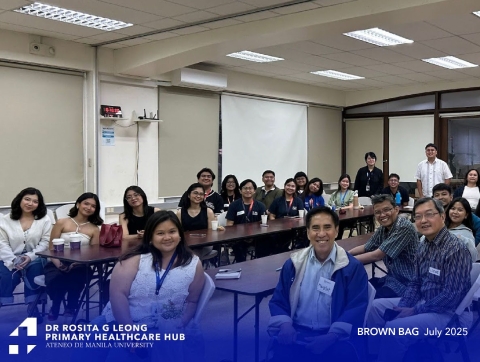ASOG holds TPC PDF culminating conference
19 Mar 2025
On 17 March 2025, the Ateneo School of Government (ASOG), through the Ateneo Policy Center (APC), held the Culminating Conference for the Tobacco Prevention and Control Policy Development Fellowship (TPC PDF) in San Alberto Hurtado Hall, Ateneo de Manila University. During the conference, the TPC PDF Fellows presented the results of their smoking cessation research and proposed policy recommendations to strengthen smoking cessation initiatives in the country. Partners from the Department of Health – Health Promotion Bureau (DOH-HPB) and Disease Prevention and Control Bureau (DOH-DPCB), Vital Strategies, TPC PDF Advisory Board members, and representatives from the tobacco control community were in attendance, providing comments and feedback on the Fellows’ presentations.
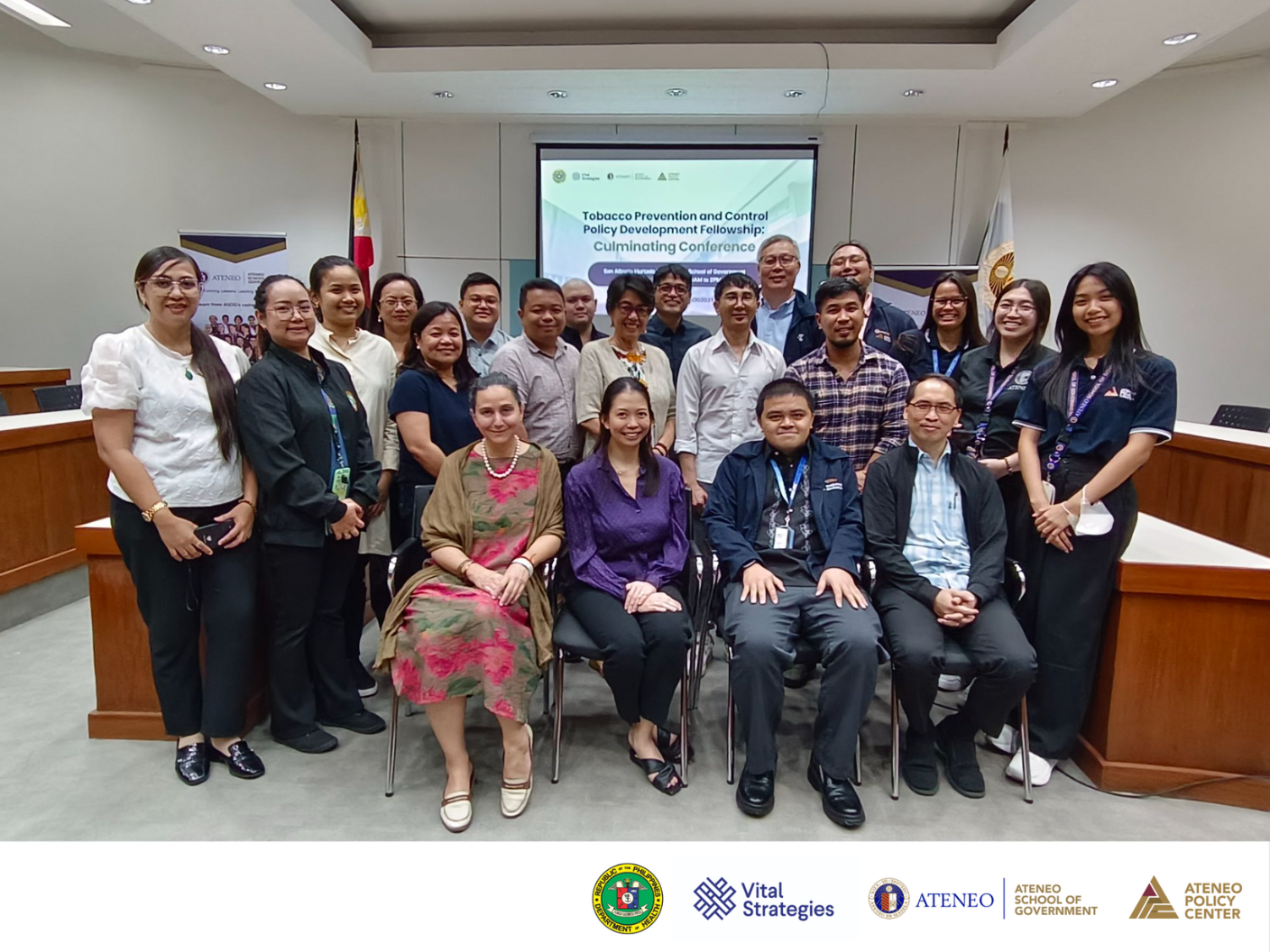
The TPC PDF is an 8-month-long fellowship program launched last July 2024 to support the evidence-generation activities of the Philippines’ National Tobacco Prevention and Control Strategy 2030 (NTPCS 2030). Two Fellows, Mr. Veincent Christian F. Pepito and Dr. Veronica M. Prasad, were selected amongst multiple applicants for their excellent policy research proposals. The Culminating Conference marked the completion of the fellowship program, along with the completion of their research and presentation of the results of their respective studies.
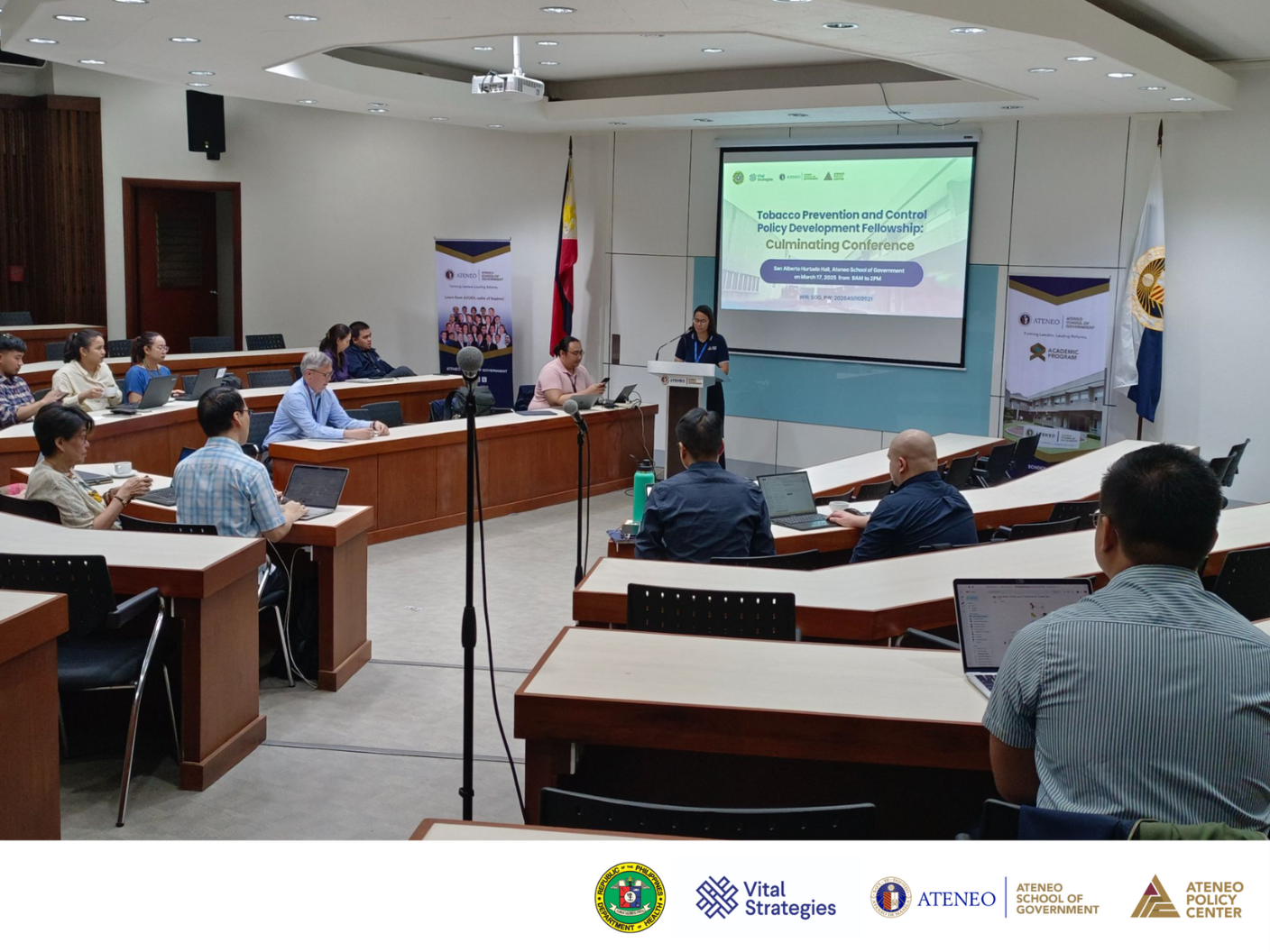 Mr. Pepito presented the results of and policy recommendations for his working paper entitled “Factors affecting access to and utilization of tobacco and nicotine use cessation services in the Philippines: a qualitative study.” The study aims to identify and understand the personal, socio-cultural, and health systems factors that affect access and utilization of tobacco and nicotine use cessation services in the Philippines. Mr. Pepito concluded that these personal, socio-cultural, and health systems factors can be leveraged as key messages for health promotion or be addressed to improve access to and utilization of smoking cessation services. He proposed the following policy recommendations: (1) for PhilHealth: create a benefit package for tobacco and nicotine cessation to address cost issues for service users; (2) for DOH-HPB: re-package the promotion of smoking cessation services through positive campaign as opposed to negative campaign; (3) for DOH-Smoking Cessation Program: address fragmentation of tobacco and nicotine use cessation services in the country; (4) for DSWD: integrate tobacco and nicotine use cessation services as a condition for conditional cash transfer (4P’s) and other aid programs (AICS, AKAP, etc.); (5) for LGUs: invest in tobacco and nicotine use cessation services that are sensitive to local setting and language, and conduct regular community mobilization to encourage people to avail of these services.
Mr. Pepito presented the results of and policy recommendations for his working paper entitled “Factors affecting access to and utilization of tobacco and nicotine use cessation services in the Philippines: a qualitative study.” The study aims to identify and understand the personal, socio-cultural, and health systems factors that affect access and utilization of tobacco and nicotine use cessation services in the Philippines. Mr. Pepito concluded that these personal, socio-cultural, and health systems factors can be leveraged as key messages for health promotion or be addressed to improve access to and utilization of smoking cessation services. He proposed the following policy recommendations: (1) for PhilHealth: create a benefit package for tobacco and nicotine cessation to address cost issues for service users; (2) for DOH-HPB: re-package the promotion of smoking cessation services through positive campaign as opposed to negative campaign; (3) for DOH-Smoking Cessation Program: address fragmentation of tobacco and nicotine use cessation services in the country; (4) for DSWD: integrate tobacco and nicotine use cessation services as a condition for conditional cash transfer (4P’s) and other aid programs (AICS, AKAP, etc.); (5) for LGUs: invest in tobacco and nicotine use cessation services that are sensitive to local setting and language, and conduct regular community mobilization to encourage people to avail of these services.
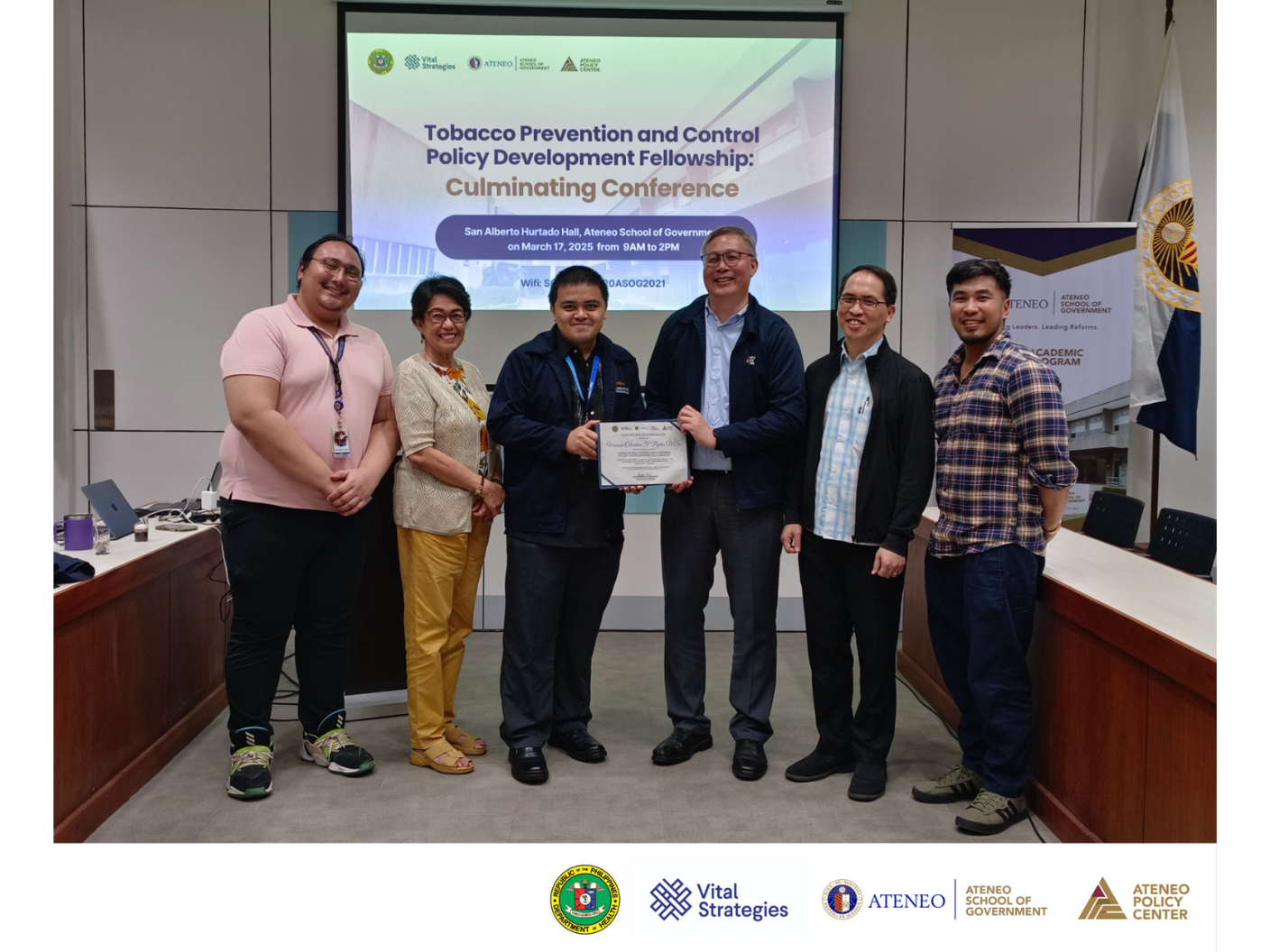 Dr. Prasad presented the results and policy recommendations of her working paper entitled “The cost-effectiveness of smoking cessation interventions in the Philippines.” The study aims to assess the cost-effectiveness of nicotine replacement therapy (NRT) patches with behavioral counseling compared to behavioral counseling alone through the national Quitline in terms of cost per quality-adjusted life years (QALY) gained. According to Dr. Prasad, the use of NRT patches with behavioral counseling through the Quitline is cost-effective, but it is not considered “highly cost-effective.” Thus, she suggested that adjusting the costs and altering the dosage and duration of NRT patches may increase the cost-effectiveness of NRT complemented by behavioral counseling through the Quitline.
Dr. Prasad presented the results and policy recommendations of her working paper entitled “The cost-effectiveness of smoking cessation interventions in the Philippines.” The study aims to assess the cost-effectiveness of nicotine replacement therapy (NRT) patches with behavioral counseling compared to behavioral counseling alone through the national Quitline in terms of cost per quality-adjusted life years (QALY) gained. According to Dr. Prasad, the use of NRT patches with behavioral counseling through the Quitline is cost-effective, but it is not considered “highly cost-effective.” Thus, she suggested that adjusting the costs and altering the dosage and duration of NRT patches may increase the cost-effectiveness of NRT complemented by behavioral counseling through the Quitline.
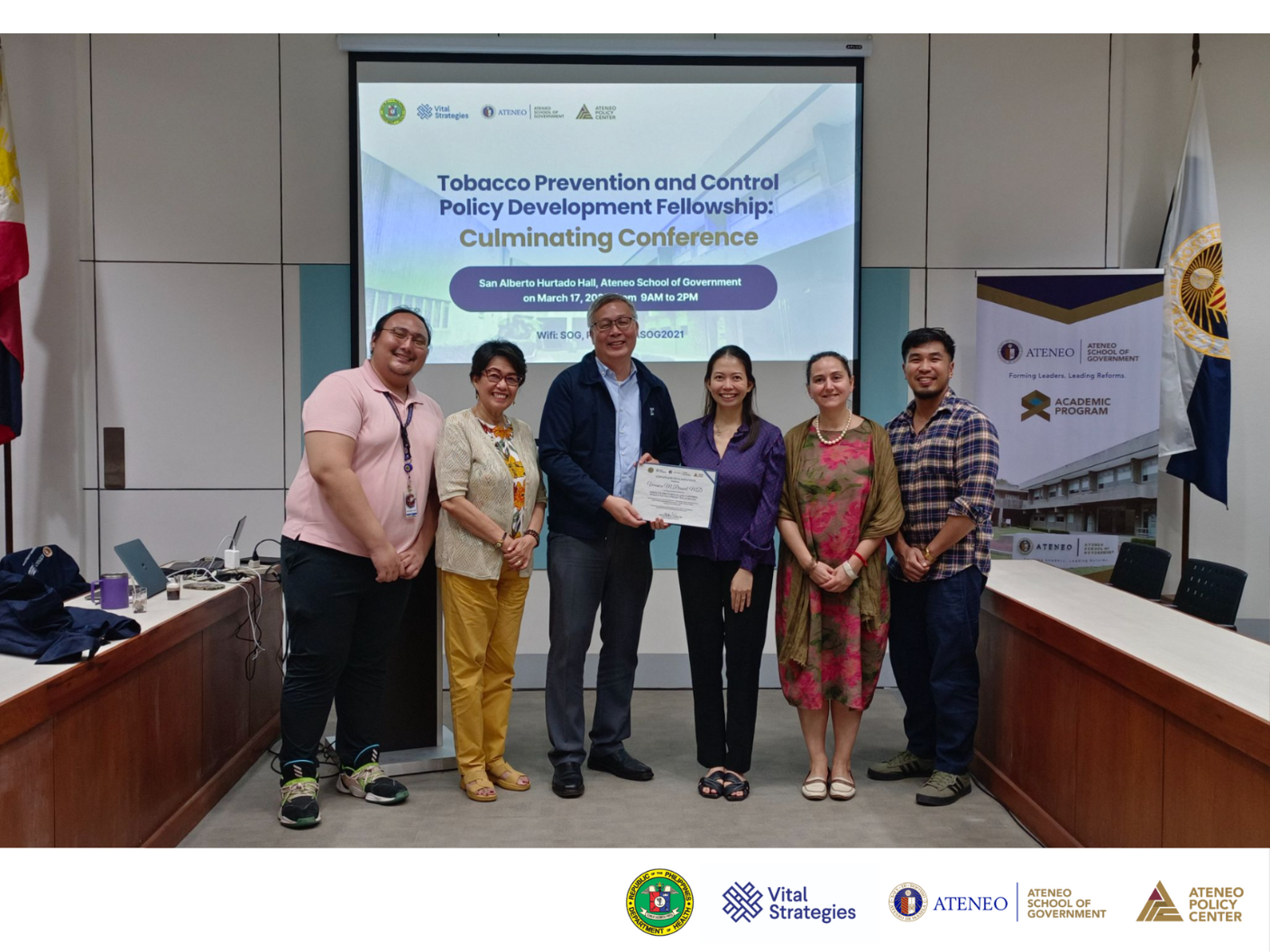
In the coming months, the Fellows will focus on publishing their working papers in peer-reviewed journals. The Tobacco Control and Governance team is optimistic that their studies may inspire future smoking cessation-related research and contribute to the development of tobacco control policy in the Philippines.


